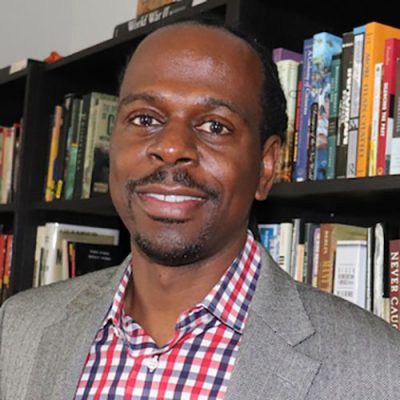As part of our 20th anniversary celebrations, we've checked in with former fellows to gather reflections on their fellowship years, to get an update on their fellowship projects, and to see what they are working on next. Read them all here.
 2018–2019 Faculty Fellow Dr. Dexter Gabriel is Assistant Professor of History at UConn. He earned his B.A. in history from Texas State University-San Marcos, an M.A. in history also from Texas State University-San Marcos, and his Ph.D. in history from Stony Brook University-New York. His research interests include the history of bondage, resistance, and freedom in the Black Atlantic, as well as interdisciplinary approaches to slavery within popular culture and media. His current research explores British Emancipation in the Anglo-Caribbean and its impact on abolitionist strategies in nineteenth-century North America. His work has been translated into the social arena through panel discussions, lectures, articles, and interviews as diverse as the Federal Reserve Bank of Virginia to Voice of America, BBC America, and elsewhere
2018–2019 Faculty Fellow Dr. Dexter Gabriel is Assistant Professor of History at UConn. He earned his B.A. in history from Texas State University-San Marcos, an M.A. in history also from Texas State University-San Marcos, and his Ph.D. in history from Stony Brook University-New York. His research interests include the history of bondage, resistance, and freedom in the Black Atlantic, as well as interdisciplinary approaches to slavery within popular culture and media. His current research explores British Emancipation in the Anglo-Caribbean and its impact on abolitionist strategies in nineteenth-century North America. His work has been translated into the social arena through panel discussions, lectures, articles, and interviews as diverse as the Federal Reserve Bank of Virginia to Voice of America, BBC America, and elsewhere
What was your fellowship project about?
I was working on turning my dissertation into a book manuscript for submittal. Titled Jubilee’s Experiment, it explored the impact of British Emancipation on American abolitionism in the 19th century.
Would you give us an update on the project?
The manuscript is currently under contract with Cambridge University Press.
How did your fellowship year shape your project, or shape your scholarship in general?
I was able to use that invaluable time to really think through my project. Dissertations are inherently different from book manuscripts, and I was able to go about the process of trying to imagine what those differences were and how they could coalesce into a working narrative.
Would you share a favorite memory from your time as a UCHI fellow?
Sitting and sharing tea, coffee, and dessert with other fellows—talking about our work, the challenges we were facing, and just talking about academic life in general.
What are you working on now (or next)?
Finishing up for final submission of the book manuscript. Next up, research for a book project on African American emigration to the Caribbean during the 19th century.
Our theme for UCHI’s 20th anniversary year is “The Future of Knowledge.” What would you say are some of the challenges facing the future of knowledge? And what do you think is most exciting or promising about the future of knowledge?
Perhaps one of the greatest challenges we’re facing comes ironically from our success. Thanks to technology today, we can both access knowledge and disperse it in ways before unimagined. We are quite literally in an age of boundless information. At the same time, interpreting that information, discerning fact from fiction, and outright misinformation, has become a serious problem. What gives promise is that despite these challenges, it does show that people are still curious about the world around them, about the past, and their place in the world. I don’t think that quest for knowledge is disappearing from the human experience any time soon.

